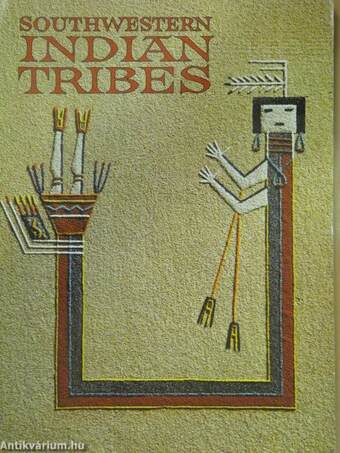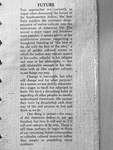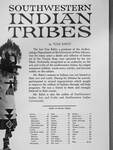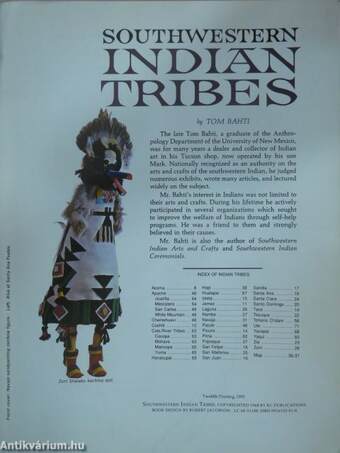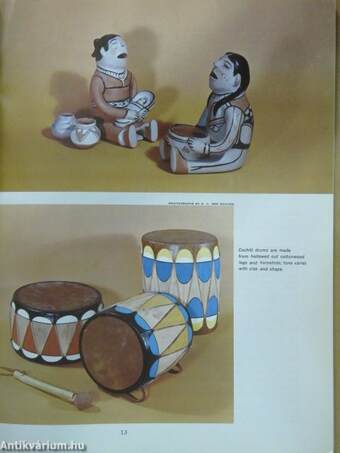1.063.490
kiadvánnyal nyújtjuk Magyarország legnagyobb antikvár könyv-kínálatát

VISSZA
A TETEJÉRE
JAVASLATOKÉszre-
vételek
Southwestern Indian Tribes
| Kiadó: | KC Publication |
|---|---|
| Kiadás helye: | Las Vegas |
| Kiadás éve: | |
| Kötés típusa: | Tűzött kötés |
| Oldalszám: | 72 oldal |
| Sorozatcím: | |
| Kötetszám: | |
| Nyelv: | Angol |
| Méret: | 30 cm x 23 cm |
| ISBN: | 0-916122-01-8 |
| Megjegyzés: | Színes és fekete-fehér fotókkal, illusztrációkkal. |
naponta értesítjük a beérkező friss
kiadványokról
naponta értesítjük a beérkező friss
kiadványokról
Fülszöveg
FUTURE
Two approaches are currently in
vogue when discussing the future of
the Southwestern Indian; the first
flatly predicts the imminent disap-
pearance of native cultures into the
mainstream of American life. The
second is more vague and therefore
more popular; it speaks gently of the
acculturative process, suggesting a
thoughtful blending of "the best of
the old with the best of the new/' a
sort of golden cultural sunset in
which the Indian may remain quaint
in his crafts, colorful in his religion
and wise in his philosophy — but
still reasonable enough in his rela-
tions with us (the supfrior culture)
to see things our way.
Change is inevitable, but who
will change and for what purpose?
As a nation we are strictly ethnocen-
tric—eager to teach but reluctant to
learn. We have a disturbing habit of
regarding all other peoples as merely
undeveloped Americans. We assume
they must be dissatisfied with their
way of life and anxious to live and
think as... Tovább
Fülszöveg
FUTURE
Two approaches are currently in
vogue when discussing the future of
the Southwestern Indian; the first
flatly predicts the imminent disap-
pearance of native cultures into the
mainstream of American life. The
second is more vague and therefore
more popular; it speaks gently of the
acculturative process, suggesting a
thoughtful blending of "the best of
the old with the best of the new/' a
sort of golden cultural sunset in
which the Indian may remain quaint
in his crafts, colorful in his religion
and wise in his philosophy — but
still reasonable enough in his rela-
tions with us (the supfrior culture)
to see things our way.
Change is inevitable, but who
will change and for what purpose?
As a nation we are strictly ethnocen-
tric—eager to teach but reluctant to
learn. We have a disturbing habit of
regarding all other peoples as merely
undeveloped Americans. We assume
they must be dissatisfied with their
way of life and anxious to live and
think as we do.
One thing is certain—the story
of the American Indian is not yet
finished, but how it will end or if it
will end remains to be seen. There is
still time, perhaps, to begin to think
of our remaining Indian communities
as valuable cultural resources rather
than simply as perplexing social
problems. Vissza
Témakörök
- Idegennyelv > Idegennyelvű könyvek > Angol > Művelődéstörténet
- Idegennyelv > Idegennyelvű könyvek > Angol > Néprajz
- Művelődéstörténet > Civilizációtörténet > Amerikai
- Művelődéstörténet > Kultúra > Története
- Művelődéstörténet > Kultúra > Kultúrantropológia
- Néprajz > Folklór (szellemi néprajz) > Népi kultúrák > Amerika
Tom Bahti
Tom Bahti műveinek az Antikvarium.hu-n kapható vagy előjegyezhető listáját itt tekintheti meg: Tom Bahti könyvek, művekMegvásárolható példányok
Nincs megvásárolható példány
A könyv összes megrendelhető példánya elfogyott. Ha kívánja, előjegyezheti a könyvet, és amint a könyv egy újabb példánya elérhető lesz, értesítjük.



